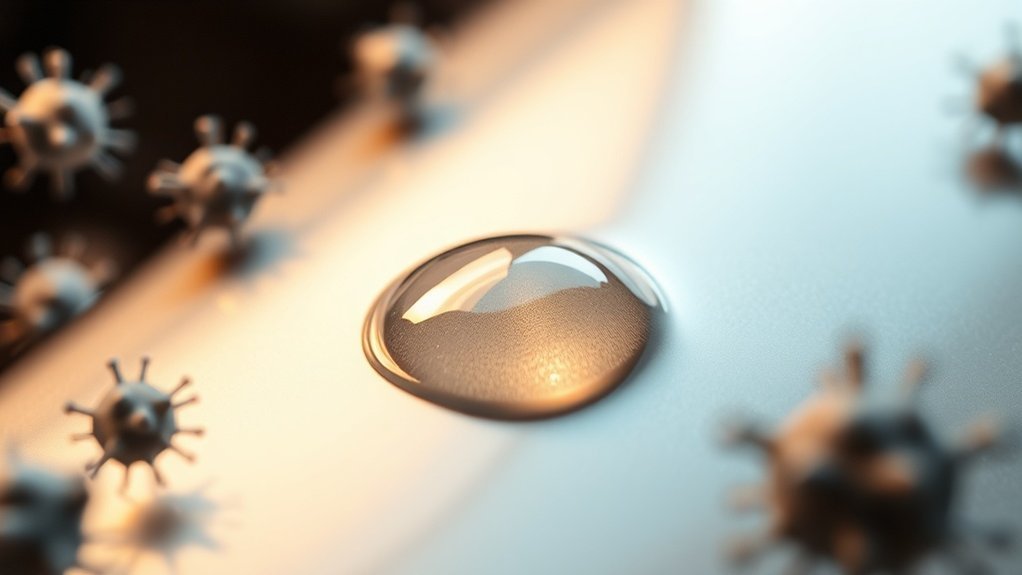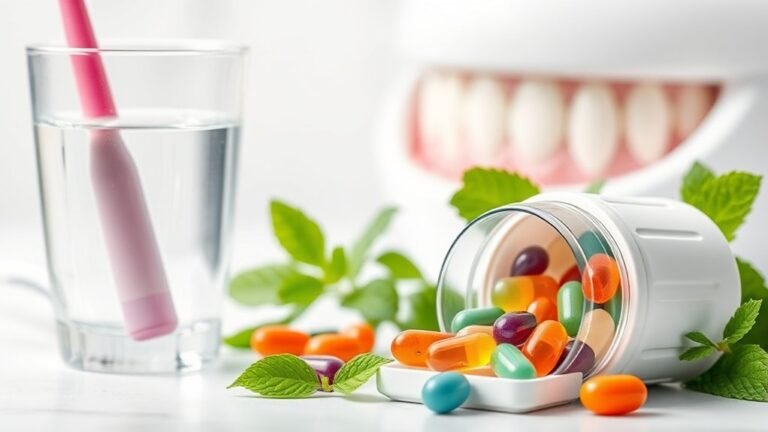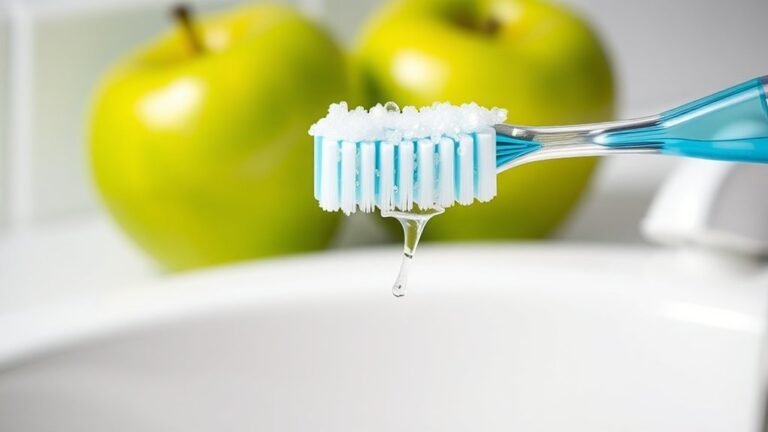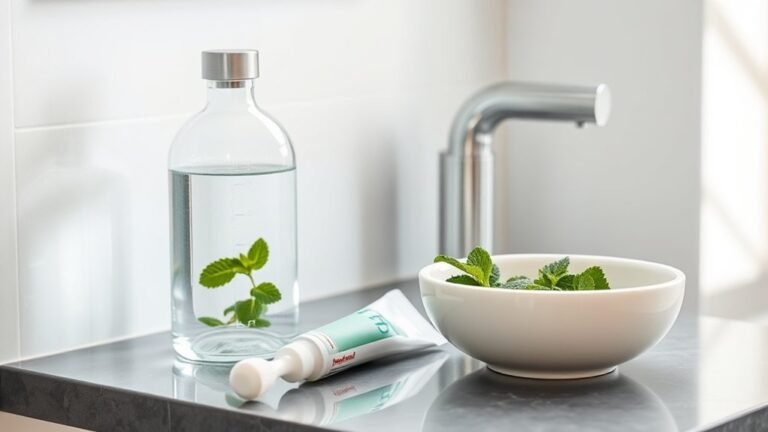What Role Does Saliva Play in Removing Mouth Bacteria Causing Odor
Saliva plays an essential role in removing mouth bacteria that cause odor by creating a hostile environment for harmful microbes. It contains enzymes and proteins that inhibit bacterial growth while neutralizing acids with bicarbonate and phosphate ions. Additionally, saliva aids in washing away food particles and maintaining oral moisture, which discourages bacteria buildup. Understanding saliva’s functions reveals much about its significance in oral health, and there’s more to uncover regarding its protective properties.
Key Takeaways
- Saliva contains enzymes and antibodies that inhibit the growth of harmful bacteria, reducing mouth odors.
- It creates a hostile environment for bacteria by maintaining a balanced pH, preventing odor-causing acid buildup.
- Saliva mechanically washes away food particles that can harbor bacteria, further minimizing bad breath.
- Adequate saliva flow helps keep the mouth moist, discouraging the proliferation of odor-causing bacteria.
- Regular hydration and oral care support saliva’s protective role in maintaining fresh breath and oral hygiene.
The Composition of Saliva and Its Antibacterial Properties
Although you may not think about it often, saliva plays an important role in maintaining oral health through its unique composition and antibacterial properties. Saliva contains enzymes, antibodies, and proteins that work together to inhibit the growth of harmful mouth bacteria. These components create a hostile environment for bacteria, reducing their ability to produce odor and contribute to bad breath. Additionally, saliva’s pH balance helps neutralize acids, further supporting oral hygiene. Its viscosity aids in the mechanical removal of food particles, which can harbor bacteria. By understanding saliva’s antibacterial properties, you can appreciate its significant function in controlling mouth bacteria and preventing unpleasant odors. Regular hydration and oral care guarantee that saliva continues to perform its crucial protective role effectively.
How Saliva Neutralizes Acids in the Mouth
Saliva plays an essential role in maintaining a balanced oral environment by neutralizing acids produced by bacteria and food consumption. When you eat, your mouth’s bacterial biofilm breaks down food, creating acids that can lead to tooth decay and bad breath. Saliva production is important in counteracting these acids; it contains bicarbonate and phosphate ions that help restore pH balance. Effective oral hygiene practices, such as regular brushing and flossing, further support saliva’s acid-neutralizing effect by reducing bacterial biofilm accumulation. This combination of saliva and proper oral care not only protects your teeth but also contributes to fresher breath. By understanding how saliva neutralizes acids, you can appreciate its significant role in maintaining your oral health.
The Role of Saliva in Maintaining Oral Moisture
Maintaining oral moisture is essential for overall oral health, and saliva plays a pivotal role in this process. Saliva flow helps keep your mouth hydrated, preventing dryness that can lead to discomfort and bacterial buildup. When your mouth is moist, it creates an environment that discourages harmful bacteria from thriving. This is significant because dry mouths are more susceptible to cavities and bad breath. Additionally, adequate saliva flow aids in washing away food particles and neutralizing acids produced by bacteria. By ensuring your mouth remains adequately moist, you support not only your oral health but also your overall well-being. So, remember to stay hydrated and maintain good saliva production for a healthier mouth.
Saliva’s Function in Food Digestion and Breakdown
The intricate process of food digestion begins in the mouth, where saliva plays an essential role. Saliva contains enzymes, such as amylase, that initiate the breakdown of carbohydrates. As you chew, saliva moistens food, making it easier to swallow and facilitating digestion in the stomach. Additionally, saliva helps control oral cavity bacteria, which can contribute to breath odor bacteria. By maintaining a balanced microbial environment, saliva reduces the likelihood of unpleasant odors that may arise from food decomposition. Consequently, saliva not only assists in the mechanical breakdown of food but also acts as a natural defense against harmful bacteria, ensuring a healthier mouth and fresher breath. This dual function underscores saliva’s importance in your overall digestive process.
The Impact of Reduced Saliva Production on Oral Health
Reduced saliva production considerably impacts oral health, leading to a host of complications. When your saliva levels drop, the balance of your oral microbiome gets disrupted. This imbalance can promote the growth of harmful bacteria, which are notorious bad breath causes. You might notice an increase in dry mouth, making it harder to wash away food particles and bacteria. With less saliva, your mouth becomes a breeding ground for odor-causing microbes, resulting in persistent bad breath. In addition, reduced saliva can lead to tooth decay and gum disease, as its protective functions diminish. Maintaining adequate saliva flow is vital for oral health, as it helps control bacteria and keeps your mouth functioning properly.
Saliva and Its Connection to Taste and Food Enjoyment
While you might not immediately associate saliva with taste, this essential fluid plays an important role in how you experience food. Saliva not only helps to dissolve food particles but also facilitates the release of flavor compounds, enhancing your sense of taste. When you chew, saliva mixes with food, allowing your taste buds to detect different flavors more effectively. This process is critical for enjoying meals and contributes to overall food satisfaction. In addition, proper oral care is linked to saliva production; a healthy mouth guarantees that you can fully appreciate the variety of tastes available. Without adequate saliva, your ability to enjoy food diminishes, highlighting its significance in both taste and overall eating experience.
Tips for Promoting Healthy Saliva Production
To promote healthy saliva production, you need to focus on a few key habits. Staying hydrated daily is essential, as it directly impacts your saliva flow. Additionally, chewing sugar-free gum can stimulate saliva production, helping to prevent dry mouth.
Stay Hydrated Daily
Staying hydrated is essential for maintaining healthy saliva production, and you should aim to drink at least eight 8-ounce glasses of water daily. Proper hydration helps your body produce adequate saliva, which plays a significant role in washing away food particles and bacteria that contribute to bad breath. When you’re dehydrated, saliva production decreases, leading to a dry mouth that allows odor-causing bacteria to thrive. Additionally, hydration supports your overall oral health, reducing the risk of gum disease and cavities. To enhance your hydration, consider carrying a water bottle throughout the day, and incorporate hydrating foods like fruits and vegetables into your diet. By prioritizing hydration, you’ll promote saliva production and minimize the chances of experiencing bad breath.
Chew Sugar-Free Gum
Chewing sugar-free gum regularly can greatly boost saliva production, making it an effective strategy for combating mouth odor. This simple habit not only aids in breath freshening but also supports plaque removal and reduces the risk of oral infections. As you chew, your mouth produces more saliva, which helps neutralize acids and wash away food particles, consequently promoting a healthier oral environment.
| Benefits | Description |
|---|---|
| Breath Freshening | Increases saliva, neutralizing odors. |
| Plaque Removal | Saliva helps wash away plaque-forming bacteria. |
| Oral Infections | Enhanced saliva flow reduces infection risk. |
Incorporating sugar-free gum into your routine is a smart choice for maintaining oral health and freshness.
Avoid Dry Mouth
Maintaining adequate saliva production is essential for oral health, as a dry mouth can lead to unpleasant breath and increase the risk of dental issues. Here are some tips for promoting healthy saliva production:
- Stay Hydrated: Drink plenty of water throughout the day to keep your mouth moist and combat dry mouth.
- Limit Caffeine and Alcohol: These substances can contribute to dehydration and reduce saliva flow, so try to minimize their intake.
- Eat Foods That Stimulate Saliva: Crunchy fruits and vegetables, like apples and carrots, can promote saliva production and serve as a natural breath odor treatment.
Frequently Asked Questions
Can Bad Breath Be Caused by a Lack of Saliva?
Yes, a lack of saliva can definitely cause bad breath. Saliva helps cleanse your mouth, removing food particles and bacteria. When it’s insufficient, these elements linger, leading to unpleasant odors and potential oral health issues.
How Does Dehydration Affect Saliva Production and Mouth Bacteria?
When you’re dehydrated, your mouth feels like a desert. This dryness reduces saliva production, allowing harmful bacteria to thrive, leading to increased bad breath and oral health issues. Staying hydrated is essential for maintaining balance.
Are There Foods That Stimulate Saliva Production?
Yes, sour foods like lemons and pickles stimulate saliva production. Crunchy fruits and vegetables, such as apples and carrots, also help. These foods promote saliva flow, aiding digestion and maintaining oral health effectively.
What Are the Symptoms of Low Saliva Levels?
Did you know nearly 20% of adults experience dry mouth? Symptoms of low saliva levels include difficulty swallowing, a dry or sticky feeling in your mouth, bad breath, and an increased risk of tooth decay.
Can Saliva Help With Oral Infections?
Yes, saliva helps with oral infections by providing antimicrobial properties, aiding in the healing process, and promoting a balanced oral environment. It flushes away food particles and bacteria, reducing the risk of infection.
Conclusion
In summary, saliva plays an essential role in combating mouth bacteria that cause odor, much like a knight defending a castle. Its antibacterial properties, ability to neutralize acids, and maintenance of oral moisture are vital for overall oral health. Reduced saliva production can lead to various issues, including bad breath. By understanding and promoting healthy saliva production, you can enhance your oral hygiene and enjoy a fresher, more pleasant mouth. Don’t underestimate the power of your own saliva!






